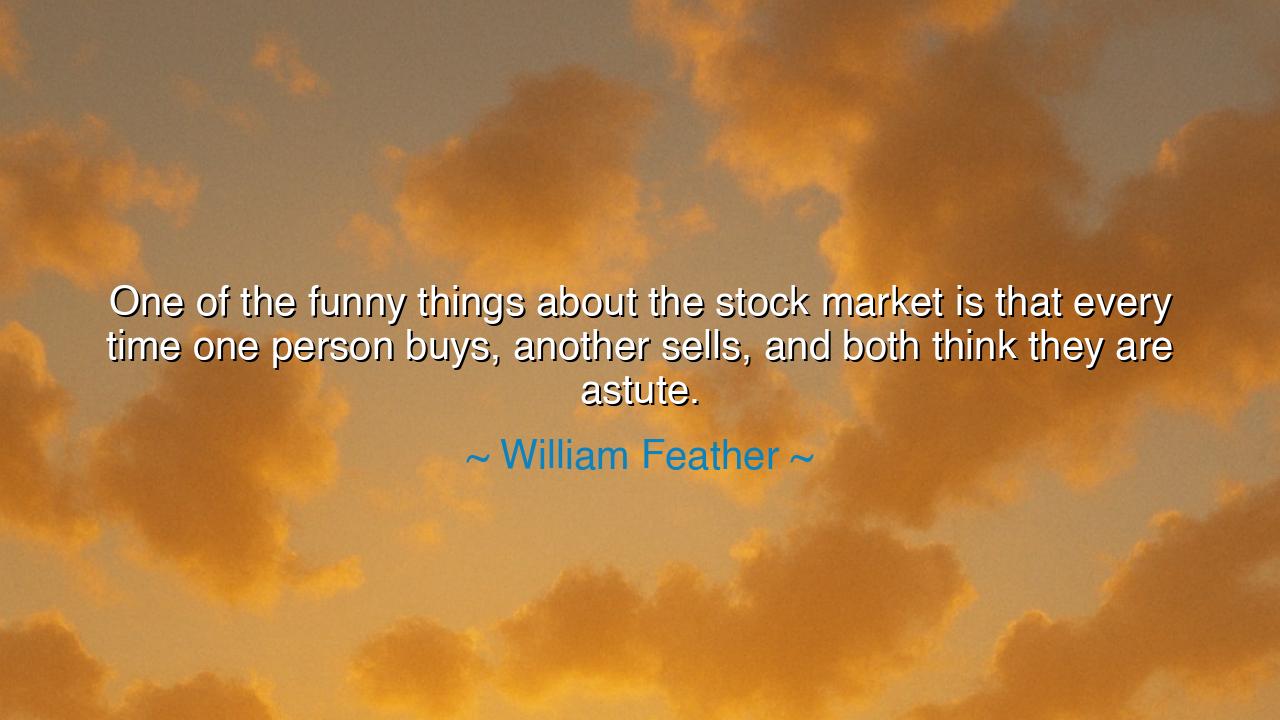
One of the funny things about the stock market is that every time
One of the funny things about the stock market is that every time one person buys, another sells, and both think they are astute.






"One of the funny things about the stock market is that every time one person buys, another sells, and both think they are astute." – William Feather
In the old days, when men gathered in bustling markets beneath marble columns, trading spices, bronze, and dreams, there was always a quiet irony that haunted their exchanges: both buyer and seller believed themselves wise. So too in the stock market, that modern forum of fortune and folly, where wealth changes hands like waves meeting the shore — each believing the tide turns in their favor. William Feather, a man of keen observation and sharp wit, gave voice to this eternal paradox. His words are not mere jest, but the mirror of human self-belief, that radiant fire which blinds even as it warms.
Feather’s insight reminds us that perception creates conviction. In every trade, one believes the price will rise, the other that it will fall. Each is guided by faith — not always in numbers, but in themselves. This dual faith, this dance of opposing certainties, is what gives the market life. Without it, there would be no motion, no trade, no opportunity for gain or loss. Yet beneath this lies a deeper truth: the market is not just a ledger of prices, but a reflection of human nature — confident, hopeful, and often mistaken.
Consider the story of Sir Isaac Newton, one of the greatest minds to ever walk the earth. In the early 18th century, he invested in the South Sea Company, a stock that promised riches beyond measure. When its price soared, he sold early, gaining a tidy profit. Yet as he watched others grow wealthy beyond imagination, his mind — that once mastered the laws of motion — fell prey to the laws of envy and greed. He bought again at the height of the frenzy, only to see the company collapse soon after. Newton lost his fortune and is said to have lamented, “I can calculate the motions of heavenly bodies, but not the madness of men.” Here, both buyer and seller believed they were astute, yet only the market itself — cold, unfeeling, and ever-changing — proved the true teacher.
In Feather’s saying, there is a quiet laughter, not of mockery but of understanding. He speaks of human folly, that universal condition which binds the wise and the foolish alike. For every act of cunning, there is an equal act of faith; for every prediction, an uncertainty waiting in the shadows. The market becomes a stage where ego performs in the mask of intelligence, and chance writes the script. It is not the clever who triumph always, but those who balance wisdom with humility, and fortune with restraint.
The ancients would have understood this. They saw the same pattern in the tides, in the turning of seasons, in the rise and fall of empires. The Greeks called it hubris, that dangerous pride which blinds the mortal eye. In markets, as in life, men often mistake confidence for clarity and hope for truth. The wise man, therefore, walks gently — not because he fears loss, but because he understands that certainty is a mirage. To be truly astute, one must doubt even one’s own brilliance.
The lesson of Feather’s words is simple, yet eternal: beware the illusion of wisdom. Do not trust too deeply in the belief that you see more clearly than others. Instead, learn to listen — to the rhythm of the world, to the murmurs of change, to the silence that follows the noise of certainty. The market, like life, rewards not those who are loudest in conviction, but those who are most patient in observation.
So, dear listener, if ever you stand before a choice — whether to buy or to sell, to leap or to wait — remember this: both sides think themselves right, yet only time will reveal the truth. Be humble in your judgment, disciplined in your desire, and steadfast in your learning. Let every gain teach you modesty, and every loss teach you wisdom. For the true profit lies not in gold or shares, but in the quiet mastery of oneself — that rarest and most enduring of fortunes.






AAdministratorAdministrator
Welcome, honored guests. Please leave a comment, we will respond soon